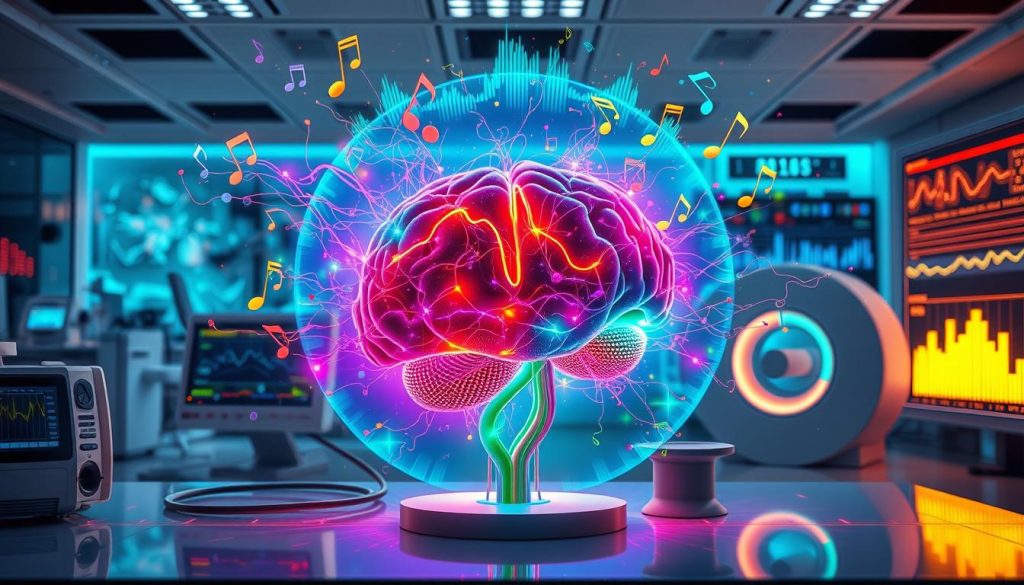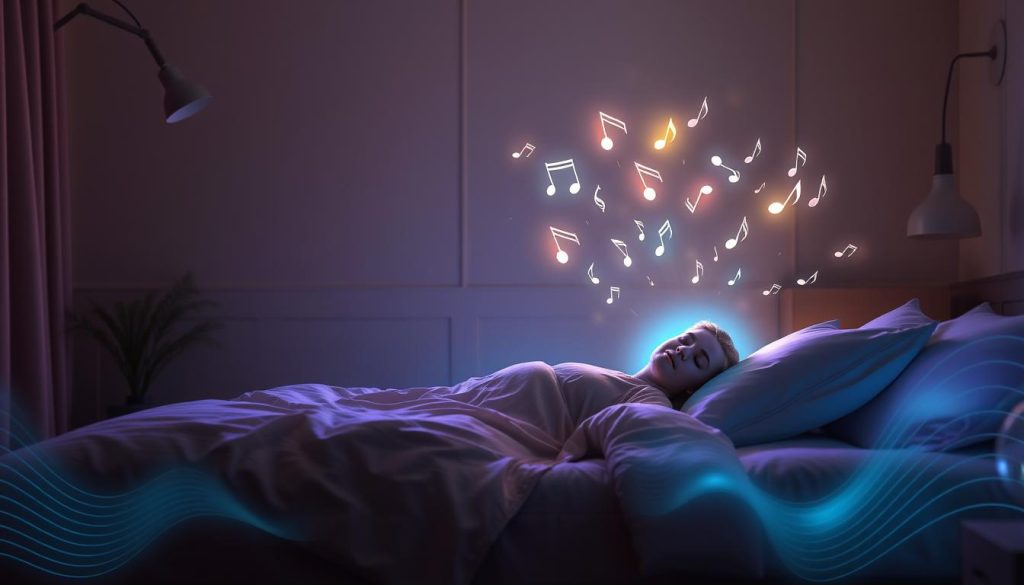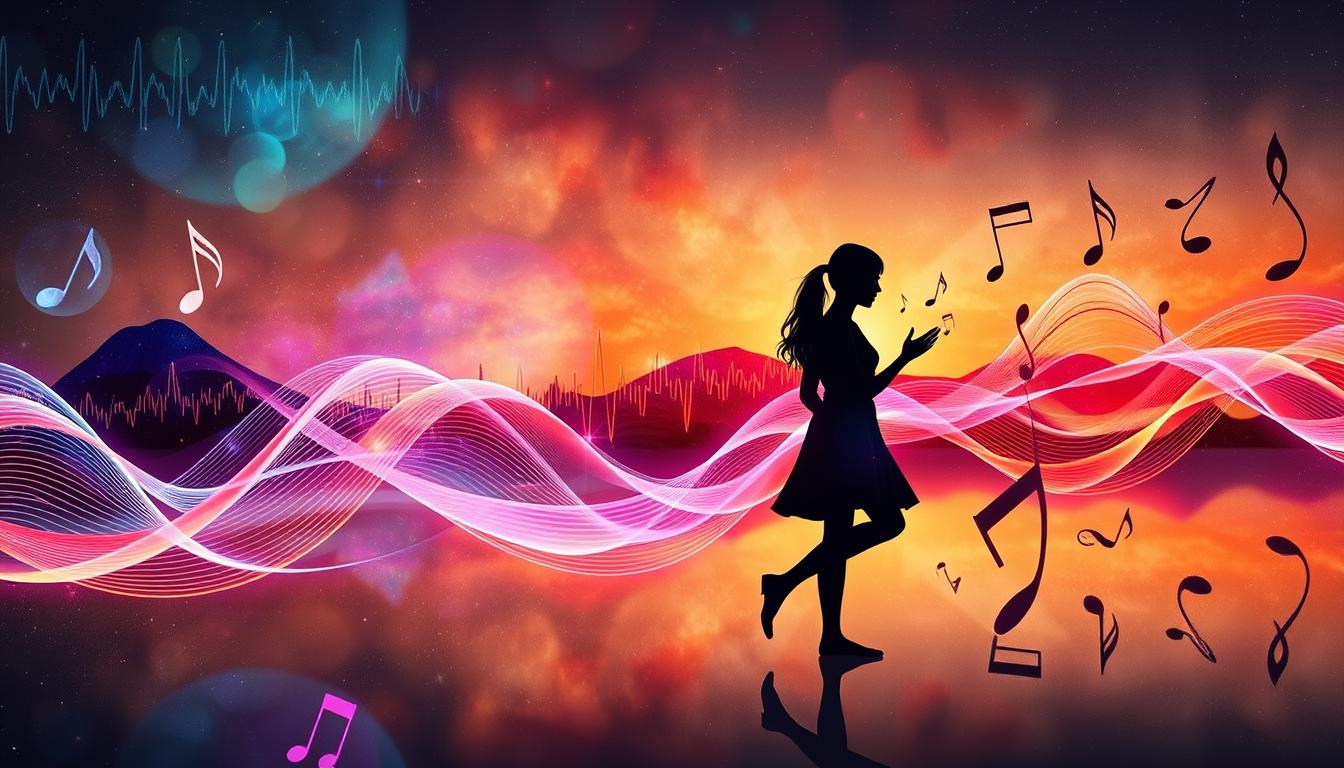Ever noticed how some songs make your heart beat fast, while others calm you down? Music’s impact is more than just fun; it deeply affects our bodies and minds. It can change our mood and help us deal with stress, thanks to the power of sound.
Let’s explore the amazing research from the American Psychological Association, Harvard Health Publishing, and The Sport Journal. They show how your favorite songs are not just background noise. They’re actually key to improving your health and mood.
Quick Recommendation: Our blog covers the impact of music on the human body. If you specifically want a program with soothing sounds of nature and pleasant tones that will assist with your meditation, mindfulness, relaxation, mental health, and stress management, we recommend the InnaPeace program.
The Science Behind Music and the Human Body
Neuroscientific research shows music’s deep impact on our bodies. It’s not just something we hear; it sparks brain activity. When you listen to your favorite songs, parts of your brain linked to feelings, memories, and focus light up. A study by Stanford University School of Medicine explains how music affects these brain circuits.
The brain’s activity is closely tied to hormonal changes. Different hormones, like dopamine and cortisol, change with the music’s rhythm and melody. For instance, a study in Frontiers in Psychology found that different music genres can cause different hormonal reactions. This is why you might feel calm with classical or energized with rock.

Research on brainwaves and hormones has led to music therapy. It uses music to treat various conditions, from anxiety and depression to neurological disorders. Therapists use music to help patients feel certain emotions and improve their health. This shows the amazing science behind how music impacts our bodies.
How Music Affects Heart Rate
Listening to music, especially with a clear tempo, can make your heart beat in time. This is called rhythmic entrainment. Studies in the Circulation Journal show that music’s tempo can change your heart rate. Faster music makes your heart beat faster, while slower music makes it slower.
Music does more than just sync with your heart. It can also help you relax and lower stress. The European Heart Journal explains how music can affect your heart rhythm and health.

Adding music to your day can be good for your heart. Whether it’s an upbeat song for energy or a calming melody for relaxation, music is fascinating. It can even help your heart stay healthy by inducing a relaxation response.
The Role of Music in Stress Reduction
Listening to your favorite tunes can do more than just elevate your mood. It can also lower cortisol levels and other stress biomarkers. A study in the Psychoneuroendocrinology Journal found that music reduces cortisol levels, which show stress in your body.
When you listen to therapeutic playlists made for relaxation, you see a drop in anxiety. This leads to better mental health overall.

The Journal of the American Medical Association also backs this up. It shows that calming music can really help reduce stress. Adding therapeutic playlists to your daily routine boosts your mental health.
It helps you find a balanced and peaceful state of mind. Whether it’s classical music, ambient sounds, or your favorite relaxing tracks, music is a powerful tool against stress.
The Connection Between Music and Sleep
Music greatly affects sleep quality, offering a great way to relax. Studies in the Sleep Medicine Reviews journal show music’s healing power against sleep disorders. It can make your sleep patterns better, creating a calm space for rest.
Lullabies have long helped people fall asleep, especially kids. The Journal of Music Therapy research points out lullabies’ cultural and historical value. They help create peaceful sleep habits. Adults can also find comfort in these soft melodies.

Today, music goes beyond lullabies. Personalized playlists can be a great way to relax. For those with sleep issues, music can be a natural, enjoyable fix. Choosing calming songs can improve sleep and cut down on waking up at night.
The right music can lead to better sleep, blending old lullabies with new relaxation methods. Adding music to your bedtime routine can help with sleep disorders. It can also make your sleep much better.
Music and Exercise: Enhancing Performance
Music can change the game when you’re trying to boost your workout endurance. The right playlist is not just a motivator. It also helps you sync your movements with the rhythm. Studies show that tempo-based exercise sessions improve your performance by matching your pace to the music.
Music helps you keep a steady pace, making your workouts feel less hard and more fun. Research shows that music’s psychological benefits give you the motivation you need. Whether you’re running or lifting, the right music can boost your energy and make your workout better.
Also, music can distract you from the effort, making it feel less. With a great playlist, you can overcome challenges and improve your endurance. So, remember your headphones next time you go to the gym. The right music might just be the secret to your success.
Quick Recommendation: Our blog covers the impact of music on the human body. If you specifically want a program with soothing sounds of nature and pleasant tones that will assist with your meditation, mindfulness, relaxation, mental health, and stress management, we recommend the InnaPeace program.
The Influence of Music on Memory and Learning
Music and learning are closely linked. Music’s rhythm and melody help you remember things better. This makes learning easier.
Research in the Educational Psychology Review shows music helps in school. Humming a song or linking a rhythm to new info boosts memory. This is a big help in school.
The Neuropsychology Review talks about music’s effect on the brain. Certain beats help create strong memories. This is great for learning complex things fast.
Adding music to your study time can change everything. Using songs to remember things or rhythms to improve memory shows music’s power. Researchers are now seeing how music helps us learn.
Different Music Genres and Their Effects
It’s amazing how different music genres can make us feel so differently. Our musical tastes are shaped by our personalities. This, in turn, affects how we respond to various sounds. Studies show that genres like classical and jazz can make us feel relaxed and happy.
Music genres also have a big impact on culture. Genres like hip-hop and rock have changed how we talk and act. They influence our daily lives, from what we wear to the words we use.
Our feelings towards music are also influenced by culture. For example, country music speaks to people from rural areas, bringing back memories and feelings. On the other hand, EDM and pop appeal more to city folks, who enjoy fast and lively music.
Knowing how music genres influence us helps us see music’s global impact. So, when you listen to your favorite music, remember it’s more than just your taste. It’s a mix of culture and emotions that shape your experience.
The Social Benefits of Listening to Music
Music has a special power to unite people, creating strong bonds and a sense of belonging. It does this at community events and big music festivals. Listening to music together makes us feel connected.
The International Journal of Community Music says music is a universal language. It crosses cultural and language barriers, helping people come together and feel harmony.
At music festivals, you feel a deep connection with others. These events are great for making friends and feeling part of a community. The joy and shared moments create lasting bonds and a strong community spirit.
The article from Music & Science talks about how music brings people together. Making music with others builds teamwork, cooperation, and respect. This is true even in casual settings like community events.
In short, music brings many benefits to our social lives. It strengthens bonds and fosters unity and understanding. So, when you’re at a music event, remember you’re not just enjoying the tunes. You’re also helping build a more connected and harmonious society.
Using Music in Professional Therapies
Music therapy is now a key part of many professional treatments. Over time, music therapy techniques have been improved to help in therapy and recovery. These methods, from rhythmic patterns to improvisation, bring many benefits.
The American Music Therapy Association says music therapy uses a special approach. It involves clients in activities that meet their needs. Techniques like guided imagery, songwriting, and improvisation help reach therapy goals.
These methods help with mental health, thinking skills, and feelings. They offer a complete healing experience.
The Arts in Psychotherapy Journal shows music therapy’s positive effects. It helps with emotional control, social skills, and physical healing. For example, people with trauma or PTSD find comfort and expression through music.
Adding music therapy to traditional treatments also works well. It makes patients more involved and likely to stick with treatment. Music therapy is becoming a key part of therapy, thanks to its proven benefits.
Music’s Impact on Emotional Well-Being
Music deeply affects emotional intelligence, helping you grasp and manage emotions better. As “Music and Emotional Regulation” by Emotion Review shows, music engagement boosts emotional signal perception and processing.
Music is known for lifting moods. Whether you’re feeling low or just need a pick-me-up, your favorite songs can brighten your day. This makes music a key ally for emotional well-being.
In expressive therapy, music is a unique tool for emotional expression. The British Journal of Psychiatry notes that music therapy lets people express complex feelings that words can’t convey. It’s especially helpful for those facing emotional hurdles or trauma.
Moreover, music aids in building psychological resilience. The ability to bounce back from stress and tough times is crucial for mental health. Music offers a sense of stability and comfort, helping you stay resilient when things get tough.
Conclusion
Music has a big impact on our bodies and minds. It can change our heart rate and stress levels. It also helps us sleep better and exercise harder.
Science shows that music connects our bodies and minds in a special way. This connection is key to feeling good.
Music also boosts our memory and learning. It lifts our mood and helps us feel connected. It’s great for therapy and emotional health.
Adding music to our daily lives can make a big difference. It’s not just for fun; it’s a way to improve our health and happiness. By listening to music, we can live a more vibrant and joyful life.
Quick Recommendation: Our blog covers the impact of music on the human body. If you specifically want a program with soothing sounds of nature and pleasant tones that will assist with your meditation, mindfulness, relaxation, mental health, and stress management, we recommend the InnaPeace program.


Thank you for your sharing. I am worried that I lack creative ideas. It is your article that makes me full of hope. Thank you. But, I have a question, can you help me?